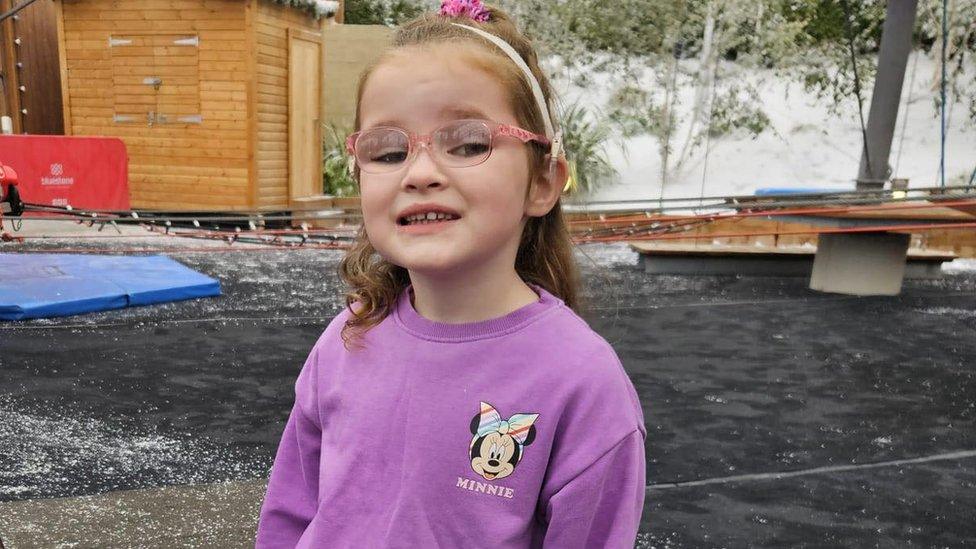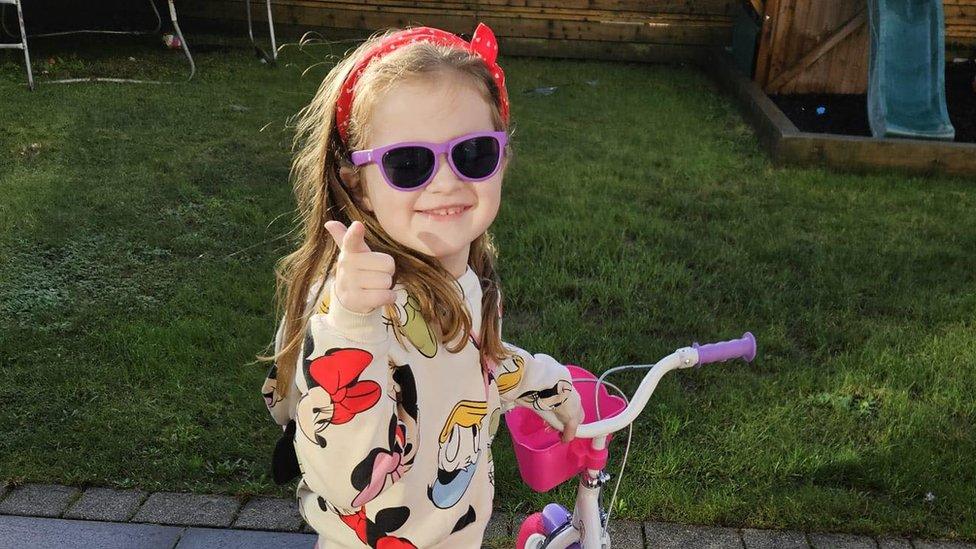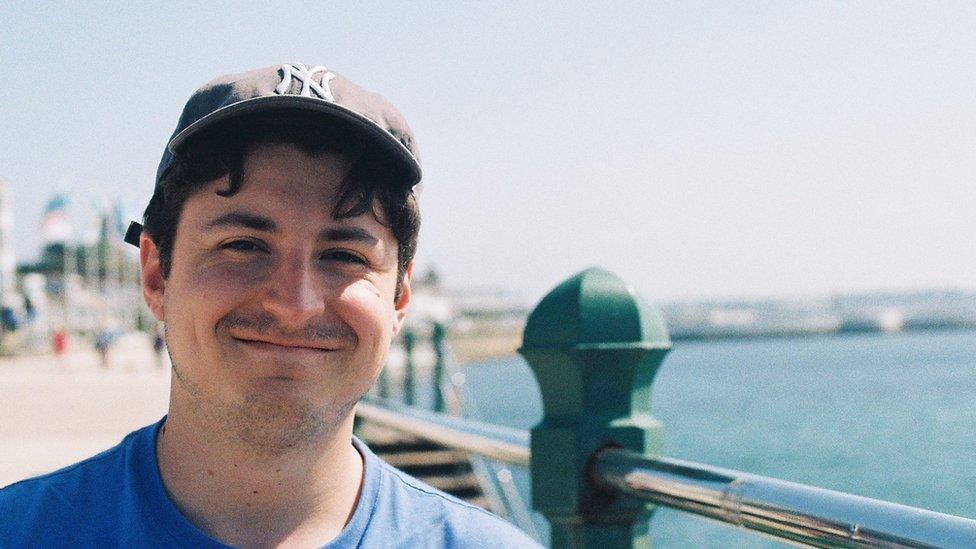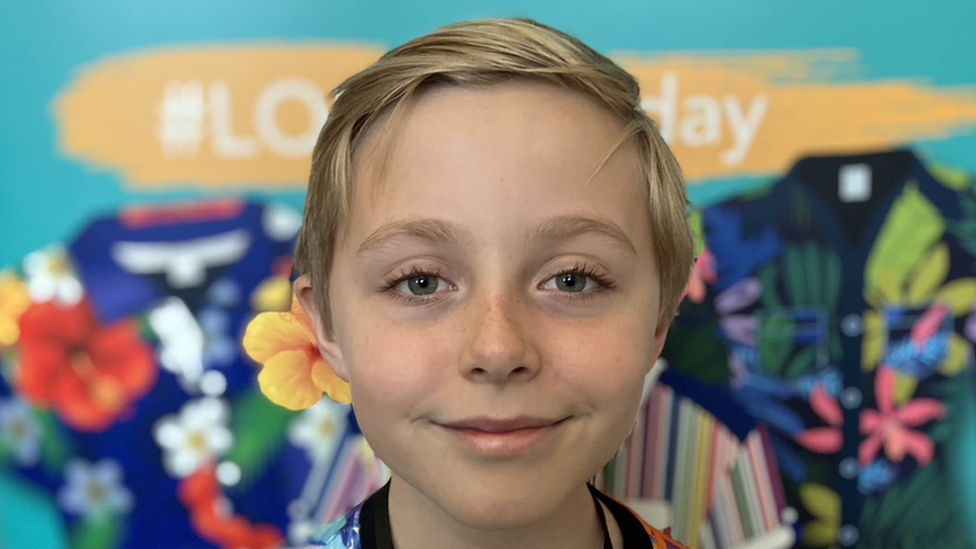Auditory Verbal Therapy: Call for funding deaf support in Wales
- Published

Grace, five, has grown in confidence since auditory verbal sessions have helped her make sense of the world around her
A five-year-old profoundly deaf girl can attend mainstream school and chat with friends following a therapy not currently available on the NHS in Wales.
Grace, from Cardiff, came out of her shell as a result of auditory verbal therapy and her cochlear implant.
Charity Auditory Verbal (AV) UK is asking for £800,000 of Welsh government funding to train staff in the practice.
The Welsh government said its existing methods supported language development.
Grace was diagnosed with cytomegalovirus (CMV) as a newborn, and referred to the audiology team.
"I think at that point I knew she was deaf. In a ward, it is quite a noisy environment and her response just wasn't there," said her mum, Rhian.
"It's a shock, it's upsetting. You go into that mode of protecting your child… you search for answers.
"You're kind of lost a little bit, and you don't know which way's the best to turn."
Rhian launched herself into research, determined Grace would learn to speak and be accepted by her peers.
She came across auditory verbal therapy (AVT), which coaches deaf children and their families to make the most of hearing technology such as hearing aids and cochlear implants, and promotes speech development through play.

Grace, from Cardiff, attends fortnightly AVT sessions over Zoom to continue developing her listening and speaking skills
Rhian learned British Sign Language (BSL) to communicate with Grace, but said AVT "put us in a different mindset of how we should be placing things in her world".
"It's very simple things that you might take for granted and do for your child because you know what they want, it's stopping doing those things and letting them ask for them themselves and using their words," she said.
Grace began AVT at two years old, and Rhian described "darting around the house with my laptop so the therapist could see her", because sessions were remote.
"From when she had the operation, getting her to wear her cochlears for long periods was a challenge, because the sound, the noise, was completely alien to her," she added.
Grace also experiences "heightened" other senses, which can make regulating herself tricky, something the AV UK team identified and is helping to address.
But Rhian says milestones such as hearing Grace say mummy and daddy for the first time, and learn her own name, make it worth it.
"I think seeing her confidence grow has been the main thing. She started off being my shadow and clinging to my leg. She's come out of her shell."

Harrison says it is "mind-blowing" that auditory verbal therapy isn't available to all deaf children in Wales
Harrison Steeple, 26, was brought up in Hong Kong, but now lives in Cardiff.
His parents learned he was deaf when he was nine months old, and he was later given a cochlear implant.
The family attended programmes across the world, including Australia and the USA, before AVT "clicked" for them.
"For my parents, it was such an upsetting time, finding out I was deaf," said Harrison.
"The internet didn't really exist at that point, so the way they found out about stuff was through other parents.
He said he mostly felt like a "normal kid", but looking back realises he missed a lot of things due to his deafness.
"When you grow up with a cochlear implant, you never quite feel like you fit in. You're trapped between two worlds, where you're partly deaf, you're partly hearing."
Harrison admitted he was "fortunate" his parents could afford to find what worked for him.
"I can notice the difference in my speech compared to other deaf adults, and it's literally [down to] the experiences we've had growing up," he said.
He is "completely independent" and working for the Royal Mint in Llantrisant.
"All the therapy I did when I was a baby has been stepping stones for me to get to where I am," he said.
"Being able to speak, clearly, is a big part of that."
He says there is "a lot more discussion" about AVT, as people who got cochlear implants in the late 1990s and early 2000s "are starting to be in a position where they can get jobs, where they can talk about their experiences".
"The fact there's no access through the NHS to AV therapy in Wales is mind-blowing to think about really."
Anita Grover, chief executive of charity AV UK, said far too many deaf children were "underachieving at school, facing lower employment prospects, at higher risk of poor mental health, social exclusion and bullying".
"What we need to make sure is that there is a really strong recognition of the diversity in deafness and there isn't just a one size fits all approach," she said.
Ms Grover - herself profoundly deaf and with a cochlear implant - said the technology helped conduct sound to the brain, but she "had to learn to be able to make sense of that sound" as an adult, whereas a child's brain would adapt more easily.
Noel Kenely, senior auditory verbal therapist, added: "A lot of adults across the UK still do not believe that a deaf child can learn how to listen and speak. So it's about changing perceptions of what deaf children can achieve."
AVT costs about £7,000 a year per child through AV UK, with fundraising helping them to offer some bursaries but not full "equitable access".
The charity's Hear Us Now campaign calls for £80,000 a year from the Welsh government, for 10 years, to train 12 existing speech and language therapists in AVT and support the most vulnerable children in the meantime.
It says 80% of children who have AVT for two or more years achieve the same spoken language as hearing children, and 270 more children in Wales could be benefiting from it.
Rhian said it would be "amazing" to see the therapy on the NHS as she "would never have been able to afford it" without AV UK's help.
"Why shouldn't Grace have the same opportunities as any other child? She wants to succeed in her life, she wants to be the best she can be, and if we can't offer that support to our children then we're not doing a very good job."
Access to hearing services was tabled in the Senedd last month, with Peter Fox MS asking health minister Eluned Morgan about AVT provision.
Ms Morgan said the Welsh government had "worked hard to become a leader in hearing care".
In a statement, it added it wanted to "ensure deaf children are seen by the right person in the right place at the right time", and its Talk with Me programme "aims to support the speech, language, and communication development of all children by supporting early years practitioners and families".

INSEPARABLE SISTERS: The seven-year-old conjoined twins who defied all odds
JUNE: VOICE OF A SILENT TWIN: The tragic story of June, her sister and their life in Broadmoor

Related topics
- Published19 October 2023

- Published20 February 2024